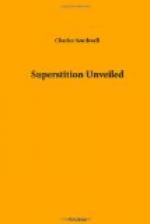But few among professional mystifiers will admit this, obviously true as it is. Some have done so. Baxter, of pious memory, to wit, who said, I am not so foolish as to pretend my certainty be greater than it is, because it is dishonour to be less certain; nor will I by shame be kept from confessing those infirmities which those have as much as I, who hypocritically reproach with them. MY CERTAINTY THAT I AM A MAN IS BEFORE MY CERTAINTY THAT THERE IS A GOD.
So candid was Richard Baxter, and so candid are not the most part of our priests, who would fain have us think them altogether unsceptical. Nevertheless, they write abundance of books to convince us ‘God is,’ though they never penned a line in order to convince us, we actually are, and that to disbelieve we are is a ‘deadly sin.’
Could God be known, could his existence be made ’palpable to feeling as to sight,’ as unquestionably is the existence of matter, there would be no need of ‘Demonstrations of the existence of God’, no need of arguments a priori or a posteriori to establish that existence. Saint John was right; ‘No man hath seen God at any time’, to which ’open confession’ he might truly have added, ‘none ever will,’ for the unreal is alway unseeable. Yet have ‘mystery men’ with shameless and most insolent pertinacity asserted the existence of God while denying the existence of matter.
The incomprehensible is not to be defined. It is difficult to give intelligible account of an Immense Being confessedly mysterious and about whom his worshippers admit they only know, they know nothing, except that
’He
is good,
And
that themselves are blind.’
Spinoza said, of things which have nothing in common, one cannot be the cause of the other; and to me it seems eminently unphilosophic to believe a Being having nothing in common with anything, capable of creating or causing everything. ‘Only matter can be touched or touch;’ and as the Christian’s God is not material, his adorers are fairly open to the charge of superstition. An unknown Deity, without body, parts or passions, is of all idols the least tangible; and they who pretend to know and reverence him, are deceived or deceivers.
In this Christian country, where men are expected to believe and called ‘Infidel’ if they cannot believe in a ‘crucified Saviour,’ it seems strange so much fuss should be made about his immateriality. All but Unitarian Christians hold as an essential article of faith, that in him dwelt the fulness of the Godhead bodily; in other words, that our Redeemer and our Creator, though two persons, are but one God. It is true that Divines of our ‘Reformed Protestant Church,’ call everything but gentlemen those who lay claim to the equivocal privilege of feasting periodically upon the body and blood of Omnipotence. The pains taken by Protestants to show from Scripture, Reason and Nature, that Priests cannot change lumps of dough into the body, and bumpers of wine into the blood, of their God, are well known and appreciated. But the Roman Catholics are neither to be argued nor laughed out of their ’awful doctrine’ of the real presence, to which they cling with desperate earnestness.




